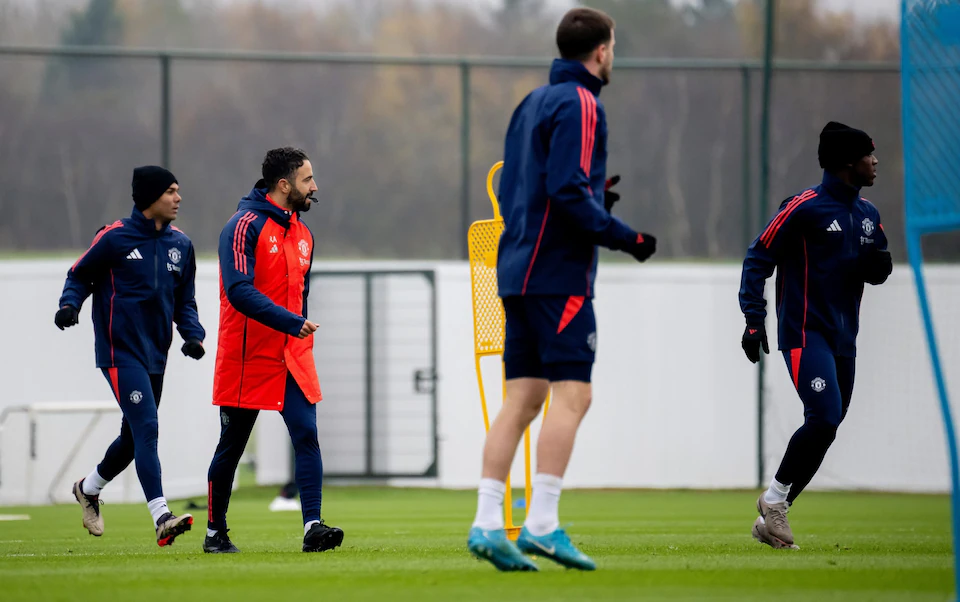Ruben Amorim’s arrival at Manchester United has signaled a cultural and tactical shift, as the 39-year-old Portuguese tactician wastes no time in embedding his philosophy into a squad that has often lacked direction this season.
Taking charge mid-campaign presents unique challenges, but Amorim has embraced the grind, determined to mold his players into a cohesive, high-intensity unit despite the condensed schedule.
Amorim’s preference for letting his work speak louder than words is already evident. Known for his reserved relationship with the media during his tenure at Sporting Lisbon, Amorim has made it clear he sees his primary role as working on the training ground, not the press room. After his debut match—a 1-1 draw against Ipswich Town—the coach quipped that his week at United had involved more media duties than his four-and-a-half years in Portugal. His focus is singular: prepare the team for the demanding Premier League environment.
Raising Fitness Levels to Combat Fatigue
A key component of Amorim’s vision involves raising fitness standards to better cope with the league’s relentless intensity. The Portuguese manager has emphasized the need for players to track back with greater urgency. Training sessions have featured drills that simulate turnovers, with Amorim blowing his whistle to halt attacks, demanding players recover their positions swiftly.
Diogo Dalot offered insight into Amorim’s demands, saying, “Sprint back and be really hard-working.” This work ethic was visible in flashes during the Ipswich game, though Amorim himself admitted the team remains a work in progress.
The 4-2-2-2 Build-Up: A Nod to Fluidity
Amorim’s tactical shifts are already reshaping United’s approach to ball progression. The build-up play has seen the team adopt a 4-2-2-2 shape when constructing attacks, allowing for a controlled transition out of defense. Against Ipswich, Noussair Mazraoui and Jonny Evans frequently pushed wide, while Matthijs de Ligt stepped into midfield alongside Casemiro. The domino effect created passing lanes, enabling United to bypass Ipswich’s press with sharp, short passes.
Amorim is no stranger to this setup, having used it effectively during Sporting’s title-winning campaign. Dalot summed it up succinctly: “He’s really demanding. He’s exactly what we need for this type of club.”
However, the system is still bedding in. With multiple center-backs—Lisandro Martínez, Harry Maguire, and Victor Lindelof—unavailable, Jonny Evans, at 36, was tasked with a physically demanding role. While the results were mixed, the structure offers a clear path forward once the squad regains full fitness and form.
Advertisement
Latest Press Conference
We’re on Social Media



Emphasis on Switches of Play
One of Amorim’s most prominent tactical trademarks is the use of switches to stretch opposition defenses. In training, the manager has focused on diagonal passes from midfielders to onrushing wing-backs, creating space for the attacking midfielders to make underlapping runs. This movement enables United to attack from the byline with crosses and cutbacks, a hallmark of Amorim’s approach.
Against Ipswich, United’s goal came within 90 seconds, sparked by a quick switch across the backline—a glimpse of what could become a more frequent weapon in their arsenal. Amorim is particularly excited about Mason Mount’s potential in this system, as the England international has previously thrived in a similar role under Thomas Tuchel.
Compactness and Control Out of Possession
Defensive organization has taken center stage in Amorim’s philosophy. United’s compact shape against Ipswich stood in stark contrast to their often disjointed displays under Erik ten Hag. Amorim’s defensive ethos—rooted more in the pragmatism of his compatriot Jose Mourinho than the possession-dominant style of Pep Guardiola—was evident. At times, United positioned eight or nine players behind the ball, reducing the spaces opponents could exploit.
However, maintaining compactness without sacrificing control remains a challenge. Ipswich managed to expose gaps behind United’s wing-backs on several occasions, underscoring the fine balance Amorim seeks to strike between defensive solidity and offensive fluidity.
A Manager in the Spotlight
While Amorim prefers to avoid media attention, his tactical acumen is already drawing significant interest. His deliberate methods and clear demands suggest he is not here for a short-term fix but rather to lay the foundation for sustained success. His desire to shield his players from distractions and immerse them in his system speaks volumes about his long-term vision.
The Portuguese manager’s journey at Old Trafford is only beginning, and he has cautioned fans to expect growing pains. “We will suffer for a long period,” Amorim warned, highlighting the challenges of implementing new ideas mid-season. Yet, early signs indicate that his meticulous planning and tactical innovations could provide the spark United need to turn their season around.
Conclusion
As Manchester United adapt to Ruben Amorim’s philosophy, the manager’s focus on fitness, compactness, and progressive buildup play will likely define his tenure. While the Ipswich draw showed both promise and areas for improvement, it is clear that Amorim’s methods are already reshaping the team’s identity. With time, his system could become the catalyst for a new era at Old Trafford. The road ahead may be challenging, but Amorim’s vision offers a tantalizing glimpse of what Manchester United could become under his stewardship.
